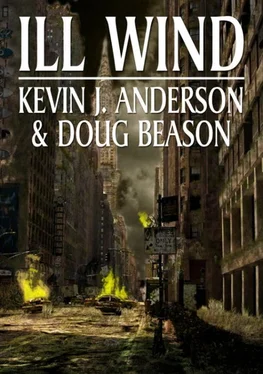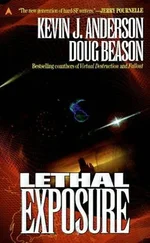Bayclock crossed the avenue in front of the HQ, habitually looking both ways before stepping into the crosswalk, then headed down the block. He saw no lights on in any of the barracks-style buildings, though some of the base personnel had opened windows to let the breeze in.
As he walked through the eerie, stifled silence, he thought about the death of Vice President Wolani two days earlier. It had shocked him deeply, but even with the President out of the country, Bayclock had solid faith in the chain of command.
The base exchange annex looked too crowded as he approached. Bayclock straightened his cap and walked briskly forward, squinting in the low-slanted sunlight. Hand-painted sandwich board signs stood propped by the BX gas pumps. CONTAMINATED FUEL. As if anybody could drive there to fill up their tanks!
A handful of people in and out of uniform milled around the BX. A ripple passed through the crowd as a tall captain noticed Bayclock and gave a salute. Bayclock returned the salute and walked through the open glass doors.
He set about gathering up anything he might need for the next few days, focusing his attention with relentless determination. The shelves looked half empty, well picked-over. Up at the cash register, the middle-aged male checker argued with an enlisted man over how many boxes of dried milk he could take. Bayclock felt like he was in combat again as he took the two remaining cans of soup—tomato and split pea, which he didn’t even like—and some bags of Cracklin’ Hot pork rinds.
As he picked up the pork rinds, though, his fingers slipped through the plastic package as if it were a half-cooked egg white. The thin film broken, air seeped out of the package, and the bag collapsed into a mucous-like slime. He stared in disgust and shock, then shook his hand to fling away the goop.
Down another aisle, plastic bottles of soda wept droplets of moisture. One bottle of Nehi grape split and collapsed, spurting purple liquid over the floor. From the sticky mess on the floor, he could tell that random bottles had been doing that all day long as different types of plastic succumbed to the microbe.
One of the BX employees, a youngish black woman with her hair trimmed as bristly short as Bayclock’s, see-sawed with a mop, frantically trying to clean up foul-smelling chlorine bleach that dribbled over the shelves into boxes of other detergents. Bayclock stiffened as he thought of the nearby plastic bottles of ammonia. If all the chemicals spilled together, they might mix to form a cloud of deadly chlorine gas.
“You! Move those bottles of ammonia!” he snapped. The woman jumped, looking at him. She dropped the mop handle. It clacked against the metal shelves as it fell. Bayclock raised his voice, annoyed at her hesitation. “Do it now.”
Without watching to see if she followed his order, Bayclock collected his rations and took his place in line at the cash register. The woman in front of him held a plastic gallon container of milk; as Bayclock watched, the handle stretched and snapped off. Milk poured down the woman’s leg and gurgled onto the floor. She dropped the container, staring stupidly at it as if her pet dog had just bitten her. Milk splashed on Bayclock’s clean trouser leg.
He stepped back, frowning at the mess she had made of his uniform. The floor felt tacky, as if from many spilled substances—but then he noticed that the linoleum itself had begun to soften.
He grabbed his supply of canned food, glanced at it, and tossed a twenty-dollar bill at the middle-aged cashier. “Keep it,” he growled. “That’s more than enough.”
Bayclock left the store at a brisk walk. He wanted to get back to the office, where he felt in control of things. It was time to establish more stringent control of the whole rationing process. Time to crack down on a lot of things.
Heather Dixon wasn’t the only one who had realized the world was going to hell. Not by a long shot.
She fought with the crowds in the camping-supply store, smelling the sweat of other people. It would take little to turn the rest of the shoppers into a mob.
Heather began to panic, moving quickly and breathing hard, afraid she wouldn’t get the equipment she needed to survive the coming months. She pushed past a tall, rail-thin woman in dissolving polyester slacks, banged into a half-empty set of metal shelves, and made her way toward the back of the store.
Two truck-driver types—one bearded, one balding—came to blows over nylon sleeping bags; Heather wondered if the nylon would last after the petroplague swept through.
At the front counter, the owner of the store—a dumpy man who looked as if he had never been camping in his life—rang up purchase after purchase with a glazed look in his eyes. He couldn’t seem to believe his luck.
Heather made her way down the aisles, clutching a sweat-wrinkled piece of paper on which she had jotted down her list of essentials. She felt sick when she saw that all of the large aluminum-framed backpacks were gone. Why had she wasted time writing out the damned list? She should have run the half mile to the store to fight for the items she had to have. Obtaining the right equipment could mean the difference between life and death, and people—a growing number of them—were just beginning to realize the scope of the breakdown.
She pushed to the backpack section, saw labels and crumpled tissue packing material scattered across the floor—and a single remaining backpack frame on the bottom shelf. One of the aluminum support bars was twisted, as if someone had tripped over it; the neon-pink fabric was garish, but what did that matter? She hoped the fabric wouldn’t dissolve, but there wasn’t anything she could do about it.
As she hurried to the last pack, a man wearing jeans and a Bugs Bunny t-shirt sprinted for it. Heather hesitated, then decided to race him. She’d had enough of being stepped on, and things were damn well going to change!
Bugs Bunny had tucked three bottles of propane for a gas cooking stove under his arm, which gave him trouble running. Heather grabbed the bent strut of the backpack, and the man pulled on the opposite side.
“I got it—” the man said.
Heather answered by jamming an elbow in his gut. With a surprised “oof!” Bugs dropped his three metal bottles of propane. They clanged and bounced on the floor, and Bugs released his hold to scramble for them.
Heather yanked the neon-pink backpack free and clutched it to her chest. “It isn’t your color anyway,” she said, then stalked down another aisle. The incident sparked her mood. It was time to stop accepting everybody’s leftovers.
Heather stood taller than most of the other women in the store and a good many of the men. She quit excusing herself every time she bumped into another shopper. They could damned well get out of her way. She recalled the advice given in the self-defense seminars Surety Insurance required their employees to take. “Don’t look like a victim.” She tried to appear stern, imagining Al Sysco standing in front of her. The thought brought a flash of cold-metal anger, and she could feel her face tighten.
People moved out of the way. She shoved aside the ones who didn’t.
She stuffed the backpack with dehydrated food in foil packages. Staring at a tiny gas-burner backpacking stove, she decided that she could cook over a campfire. She opted for a large hunting knife, some fishing equipment, and a mummy sleeping bag rated to 20 below zero.
Heather glared around the store, rejecting most of the items. A tent would be too bulky to carry all the way home. Some compact pots and pans would be nice, but unnecessary—she could adapt her own utensils. She took matches, a snakebite kit, a solar still for purifying water.
Читать дальше












